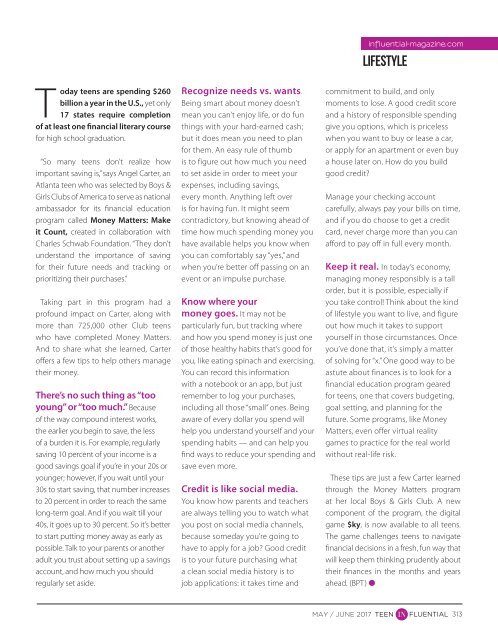InFluential_Magazine_May_June_2017
You also want an ePaper? Increase the reach of your titles
YUMPU automatically turns print PDFs into web optimized ePapers that Google loves.
influential-magazine.com<br />
LIFESTYLE<br />
Today teens are spending $260<br />
billion a year in the U.S., yet only<br />
17 states require completion<br />
of at least one financial literary course<br />
for high school graduation.<br />
“So many teens don’t realize how<br />
important saving is,” says Angel Carter, an<br />
Atlanta teen who was selected by Boys &<br />
Girls Clubs of America to serve as national<br />
ambassador for its financial education<br />
program called Money Matters: Make<br />
it Count, created in collaboration with<br />
Charles Schwab Foundation. “They don’t<br />
understand the importance of saving<br />
for their future needs and tracking or<br />
prioritizing their purchases.”<br />
Taking part in this program had a<br />
profound impact on Carter, along with<br />
more than 725,000 other Club teens<br />
who have completed Money Matters.<br />
And to share what she learned, Carter<br />
offers a few tips to help others manage<br />
their money.<br />
There’s no such thing as “too<br />
young” or “too much.” Because<br />
of the way compound interest works,<br />
the earlier you begin to save, the less<br />
of a burden it is. For example, regularly<br />
saving 10 percent of your income is a<br />
good savings goal if you’re in your 20s or<br />
younger; however, if you wait until your<br />
30s to start saving, that number increases<br />
to 20 percent in order to reach the same<br />
long-term goal. And if you wait till your<br />
40s, it goes up to 30 percent. So it’s better<br />
to start putting money away as early as<br />
possible. Talk to your parents or another<br />
adult you trust about setting up a savings<br />
account, and how much you should<br />
regularly set aside.<br />
Recognize needs vs. wants.<br />
Being smart about money doesn’t<br />
mean you can’t enjoy life, or do fun<br />
things with your hard-earned cash;<br />
but it does mean you need to plan<br />
for them. An easy rule of thumb<br />
is to figure out how much you need<br />
to set aside in order to meet your<br />
expenses, including savings,<br />
every month. Anything left over<br />
is for having fun. It might seem<br />
contradictory, but knowing ahead of<br />
time how much spending money you<br />
have available helps you know when<br />
you can comfortably say “yes,” and<br />
when you’re better off passing on an<br />
event or an impulse purchase.<br />
Know where your<br />
money goes. It may not be<br />
particularly fun, but tracking where<br />
and how you spend money is just one<br />
of those healthy habits that’s good for<br />
you, like eating spinach and exercising.<br />
You can record this information<br />
with a notebook or an app, but just<br />
remember to log your purchases,<br />
including all those “small” ones. Being<br />
aware of every dollar you spend will<br />
help you understand yourself and your<br />
spending habits — and can help you<br />
find ways to reduce your spending and<br />
save even more.<br />
Credit is like social media.<br />
You know how parents and teachers<br />
are always telling you to watch what<br />
you post on social media channels,<br />
because someday you’re going to<br />
have to apply for a job? Good credit<br />
is to your future purchasing what<br />
a clean social media history is to<br />
job applications: it takes time and<br />
commitment to build, and only<br />
moments to lose. A good credit score<br />
and a history of responsible spending<br />
give you options, which is priceless<br />
when you want to buy or lease a car,<br />
or apply for an apartment or even buy<br />
a house later on. How do you build<br />
good credit?<br />
Manage your checking account<br />
carefully, always pay your bills on time,<br />
and if you do choose to get a credit<br />
card, never charge more than you can<br />
afford to pay off in full every month.<br />
Keep it real. In today’s economy,<br />
managing money responsibly is a tall<br />
order, but it is possible, especially if<br />
you take control! Think about the kind<br />
of lifestyle you want to live, and figure<br />
out how much it takes to support<br />
yourself in those circumstances. Once<br />
you’ve done that, it’s simply a matter<br />
of solving for “x.” One good way to be<br />
astute about finances is to look for a<br />
financial education program geared<br />
for teens, one that covers budgeting,<br />
goal setting, and planning for the<br />
future. Some programs, like Money<br />
Matters, even offer virtual reality<br />
games to practice for the real world<br />
without real-life risk.<br />
These tips are just a few Carter learned<br />
through the Money Matters program<br />
at her local Boys & Girls Club. A new<br />
component of the program, the digital<br />
game $ky, is now available to all teens.<br />
The game challenges teens to navigate<br />
financial decisions in a fresh, fun way that<br />
will keep them thinking prudently about<br />
their finances in the months and years<br />
ahead. (BPT) l<br />
MAY / JUNE <strong>2017</strong> TEEN FLUENTIAL 313


















